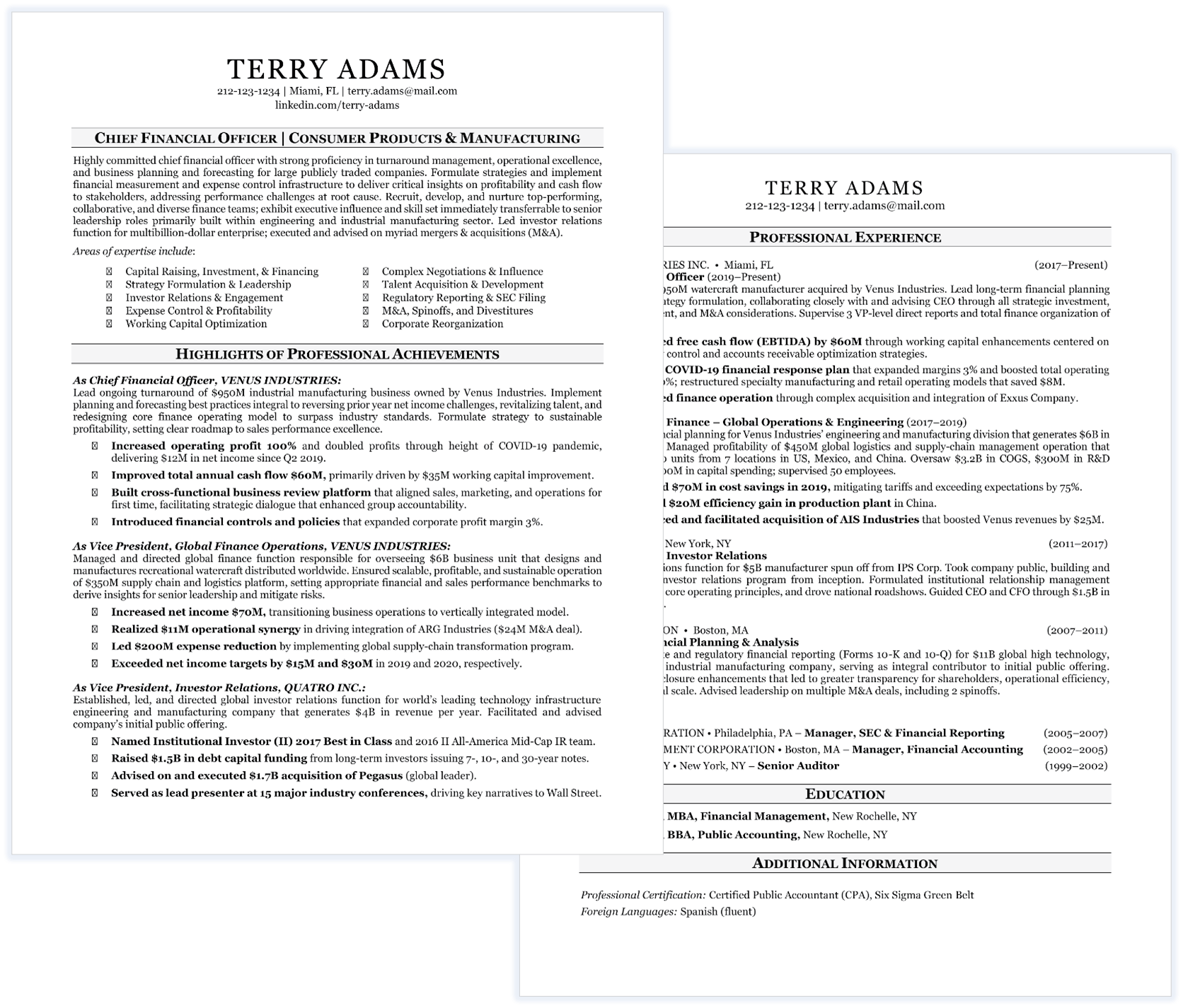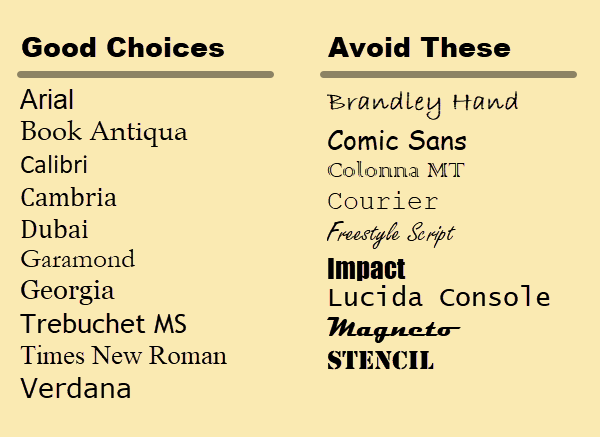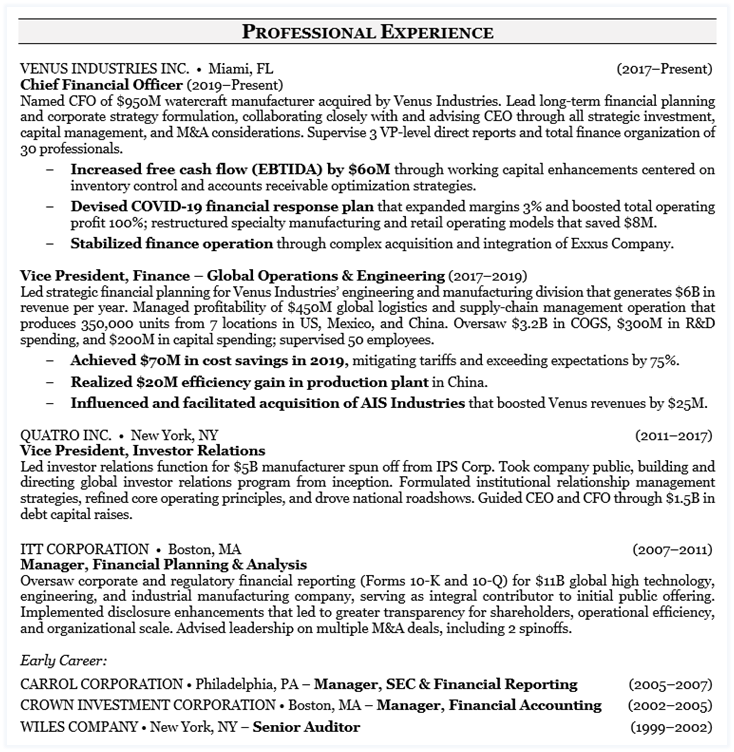Chief Financial Officer (CFO) Resume Guide
Contents
Contents
Introduction
As a Chief Financial Officer, you’re a big-picture strategist. You know how to drill into the numbers and provide critical assessments and proposals for your company. You’re looking ahead to the next big step in your career journey, so how do you translate your strategic abilities into a plan for advancement? How do you prove you have the skills and knowledge to lead an organization’s financial strategy for future growth?
This guide will walk you step-by-step through all the elements of a great resume that is sure to get you noticed! We will break down each section of a Chief Financial Officer resume, and explain how you can grab the attention of executive recruiters and human resources personnel.
A CFO By Any Other Name
- Chief of Finance
- Director of Finance
- Chief Growth Officer
Remember, it most likely took you over a decade to get to the C-suite, and there are fewer jobs at the top, so expect the development of your resume and your job search to take longer. You need to research what skills companies seek in CFOs, current market trends in your industry vertical (or how to shift to a different vertical), and how you can best leverage your experience. Then, you need to create a career branding package that makes recruiters take notice.
Keep in mind when you do the cost-benefit analysis, you have to determine if writing your own resume is worth your time.
If you decide you would rather take advantage of an executive resume writing service and use your valuable time to expand your network and uncover new job opportunities, you can request a 1-on-1 consultation with one of our experienced team members.
Understanding the Big Picture
Job hunting at the Chief Financial Officer level requires different tactics than lower-level searches, but your resume is still the top sales tool you will use to get that coveted interview. It is likely you will need to get your resume through applicant tracking systems (ATS) and human resources representatives, and you want to impress from the start.
According to a recent Korn Ferry CFO Pulse Survey, CFOs are increasingly expected to be agile business people who can learn to complement their CEOs, even as their CEO’s role changes. That means you have to sell the recruiter, the human resources department, and the CEO on much more than your financial acumen.
You may have heard that there are four types of CFOs:
- Cost-cutter
- Scorecard keeper
- Finance functionalist
- Growth guru
Rather than placing yourself into one narrowly defined role, the goal is to assess your strengths and present your unique combination of abilities. Of course, you are stronger in some areas than others, but you shouldn’t think of yourself as limited to any one trait. You probably possess a mix of these different skills, with business insight and the ability to get the best out of your team.
Just as you are responsible for strategic planning in your position as a CFO, you should take charge of the strategic planning related to your job search. Use your analytical abilities to look at your career, accomplishments, and goals so that you can craft a Chief Financial Officer resume that takes you where you want to go.
Your resume must showcase all of your distinguishing qualities and also highlight the value you add. Far from merely listing one’s previous experience, a successful CFO resume must perform the following functions:
- Serve as a visually scannable document with plenty of white space and clear organization.
- Contain a strong executive summary that describes your achievements and your abilities as a strong leader.
- Cover no more than two pages.
- Contain no grammatical, spelling, or formatting errors.
As you think strategically about what it will take to land your next role, consider efficiency and delegation. Handing off the details of creating your resume once you have done the high-level thinking about your career may be the best route for you.
Now we will examine in detail each element of a winning Chief Financial Officer resume.
Layout and Design
You may think of yourself as a numbers person, but you probably have communication and presentation skills that complement your role. You likely explain forecasts and financial models to members of the leadership team and other stakeholders, and you probably design charts and graphics to illustrate key points. Making information look good has an impact on how it is received.
Your CFO resume is no different. Once your document passes ATS scans and gets into the hands of a recruiter, you need that first visual impression to count. What are you trying to convey?
- Professionalism
- Clear organization
- Attention to detail
- Clarity of communication
What is the best strategy for formatting an executive-level resume?
Stick to the script. All resumes follow similar formats for a reason. You don’t want hiring influencers to have to hunt for relevant information, because the truth is that if they have to hunt, they will likely move on to the next resume in the queue.
Organization is particularly important for a CFO, so show it off here by using standard headings and make sure they stand out. That also means keeping your design open and readable by varying line lengths, leaving adequate margins, and using a legible font and font size. Those formatting practices make your resume easy to skim. Remember, recruiters need to decide quickly whether your CFO resume is worth a closer look.
One final word on design: Skip the graphics and excessive use of color. Instead, your resume should cleanly convey your experience and expertise, letting the content speak for itself.
Contact Information
This seems obvious, but it’s worth stating:
Your contact information belongs right at the top of your resume, easy to find and easy to read. Who you are and how to reach you are paramount to your successful job hunt. When it comes time to schedule interviews, you want your information at the recruiter’s fingertips.
Include basic information: Your name, phone number, email (use only one), and LinkedIn URL. You may include your city and state, but leave out your street address.
Your Title and Summary
The title of your resume should match the title of the job you are targeting: Chief Financial Officer. Simple. You may need to add more specifics or alter the title if the company calls its CFO by a different name, so just make sure you match the title.
Although this is called a summary, it’s actually much more than that. Summary implies a brief overview of your business career. Though it’s written in succinct language, your summary should amplify key information and attributes from your professional career history.
Phrases Often Found in CFO Job Descriptions
-
-
-
-
-
-
-
-
-
- Financial Acumen
- Strategic Growth Plans
- Performance Management
- Team Development
- Emerging Technologies
-
-
-
-
-
-
-
-
Here is where you demonstrate why you are the right person to be your target company’s next Chief Financial Officer. That means not only highlighting your career achievements but explaining how those accomplishments have prepared you for this new position. You’re an expert in your vertical, so show off some of your knowledge here, too. You should also describe your management style and why you will be a valuable asset in your new position. Include all of that in about 3–5 sentences.
One strategy for this section is to brainstorm a list of your attributes, pick the ones that match your highest-level skills, and make sure you use them to describe yourself here. Avoid too much flowery language, and make sure you back up your claims with hard data. Also use industry-specific language whenever possible.
One way to think about who you are as a CFO is to consider these categories from Gartner research organization: builder, doer, learner, persuader, strategist, or some combination of those. Each persona brings different competencies to the table.
As we move on to the next part of your resume, keep those categories in mind to help you create a coherent presentation of yourself and your skills.
Core Competencies/Skills and Accomplishments
This is the perfect place to add in the keywords and phrases that will get you past the Applicant Tracking System (ATS). While ATS algorithms are sophisticated and do more than rank your resume based on the number of relevant keywords you use, you definitely need to include the skills your potential employer considers to be of high value.
Analyze the job listing and make sure you use exact phrases. If the job listing says “profit and loss management,” don’t limit your language to just P&L. Spell it out. In fact, do both to increase your chances.
The main idea here is to include the skills and attributes that employers seek the most in a CFO. While each CFO job description is slightly different, there are common qualities that all Chief Financial Officers need. Mention your understanding of GAAP and corporate taxes, employee benefits, operations, risk management, legal issues, and any other areas where you have the knowledge to collaborate with specialists in those fields.
Common CFO Skills
| Soft Skills | |
| Leadership | ✔ |
| Communication | ✔ |
| Problem-Solving | ✔ |
| Hard Skills | |
| Financial Acumen | ✔ |
| Strategy Development | ✔ |
| Forecasting | ✔ |
There are some qualities that elevate you above the rest. The Association of Chief Financial Officers lists certain skills that set great CFOs apart.
CFOs must possess a deep knowledge of:
- Your company’s business
- Technology trends
- Market dynamics
- Operational drivers
and these exceptional soft skills:
- Flexibility
- Team building
- Communication
- Customer orientation
- High regard for change management
Add some of these skills to your core competencies list, along with the basics such as your financial forecasting and accounting abilities. Make sure you develop a list that differentiates you and includes the top skills you have acquired throughout your career.
Employment History/Professional Experience
This section takes a deep dive into your career; however, don’t get caught in the trap of listing every responsibility you have had at every job. Once you have passed the ATS scan and a quick overview by your future employer’s human resources department, the hiring manager will be looking to see what you know and what you have accomplished so far. Your demonstrated knowledge of financial planning, forecasting, and strategic thinking is critical.
First, eliminate jobs that are more than 15 years old unless they have a high significance in your career journey.
Second, make a preliminary list of the last 15 years of your career and brainstorm everything you did at each job, the dates you were there and your titles.
Third, go back and delete any accomplishments you repeated under two different job descriptions. You’ve got a lot to say and not that much space.
Take some time here to examine your career and remind yourself of the goal of your job search. Then ask yourself the following questions:
- Which of my accomplishments will best further my goal?
- Which accomplishments demonstrate the skills necessary for my next position?
- How can I organize these accomplishments to show a pattern of growth?
- Am I leaving something in because it means something more to me than it will to a recruiter or future employer?
- Do I have quantifiable accomplishments to back up my assertions?
Now for the actual writing. Try using the C-A-R format for each item: Describe your challenge, the actions you took to address it, and the results you achieved. As a numbers person, you are well aware that quantifiable data bolsters your case, so use it. If you led an initiative that increased revenue 43 percent or spearheaded a business expansion that increased market share by 23 percent, include those numbers.
Add a short paragraph describing your role, then stick with bulleted items from there: big paragraphs of text are off-putting. Bullet points are your best bet, since they create white space and emphasize each item. Quantifiable achievements are extra important for a CFO, but don’t be tempted to overexplain; recruiters are less likely to read big blocks of type. Save the background details for your interview.
Finally, open up your thesaurus app and find those powerful adjectives and verbs that show you’re a finance person of action and vision.
Keep in mind that your target audience is the CEO, so use a bulleted item or two to demonstrate your ability to work well with other executives, as well as your own team members.
Education and Awards
You’ve gotten through the difficult parts. This section is a simple listing of your degrees. You have a bachelor’s degree, most likely in accounting, finance, or another business area, and you might have earned an MBA. You have been out of school for some time, so don’t bother with your GPA.
If you want to list your publications, you may list them here by simply using the heading “Education and Publications,” or add another section if you have space within your two pages. The same goes for any industry awards or certifications.
Finished Resume Example: Putting It All Together
Now that you’ve considered each section in detail, it’s time to take a step back and look at the big picture. Peruse our example. Then consider all the advice we’ve imparted so far. There are just a few more pointers you should take into consideration:
- If your resume spans two pages, make sure you don’t split a section.
- Look over your resume for mistakes. Then, show your finished product to a trusted friend or colleague, someone who is great with words and as detail-oriented as you are. At the C-suite level, any mistake could derail your candidacy. Think of it this way, would you hire someone with errors in their resume or cover letter?
You’re almost there. All you have to do is ask yourself one question: Would I interview someone with this resume?

Next Steps
After reading this guide, have you calculated the time and effort it will take for you to do all this on your own? Do you want your resume to stand out from the crowd?
If you decide you would rather take advantage of an executive resume writing service and use your valuable time to expand your network and uncover new job opportunities, you can request a 1-on-1 consultation with one of our experienced team members.
How We Help Professionals Like You
We work exclusively with executive-level professionals like you. By leveraging our decades of experience and our proven process, our clients get hired faster and negotiate higher compensation packages. Our approach is to uncover your unique talent brand, the things that truly make you the best candidate for an executive position.
|
Resume Writing
|
||
|
Interview Prep
|
||
|
Career Coaching
|
The Power of a Professional Executive Resume
What does your personal brand say about you? Experienced executives leverage our team of certified resume writing experts to position them as the expert in their field.
You need more than just a resume; you will also need a cover letter, LinkedIn profile, and professional biography.
Here’s what our clients are saying about our process…
“I found working with ERW to be incredibly constructive. I was feeling too close to both my resume and LinkedIn page and felt that I needed a fresh set of eyes. They were able to help frame what I was trying to accomplish with my resume while pulling out my accomplishments as well [as] skills I didn’t think were relevant. They helped reposition me for the professional positions I am seeking with the idea of attracting the right suitors. I feel more empowered to seek the position that I will find fulfilling rather than settling for something less desirable. I am very pleased that I choose to work with ERW and believe their professionalism and work on my brand sets me up for success.”
–Regional Investment Director
“Recently I decided to use your company’s services to acquire a new and challenging career. I couldn’t be more impressed with the resume and cover page that I received! I have had more companies want to interview me than I thought possible. Please give your team a congratulations for me; they are truly gifted.”
–Chief Financial Officer
“I took some time last night to review the materials and some time this morning to re-review with fresh eyes. I cannot identify one edit that I would like to make. I appreciate the time we spent up front to go through my background. I honestly believe it paid off big time. Those conversations pushed me in ways I really needed to be pushed and I am extremely grateful.”
– Executive Leader in Large Financial Firm
Learn why 6,000+ executives have found success with us
If you would like to learn more about how we help our clients succeed in their careers, we invite you to request a 1-on-1 consultation with one of our team members. Simply click the button below.






